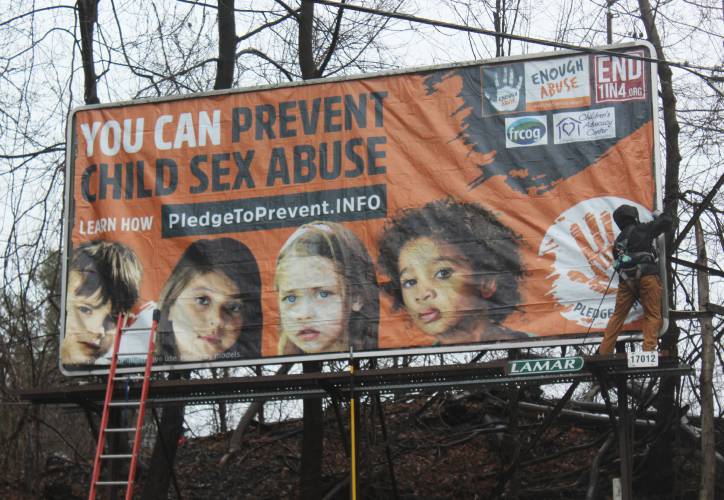Part 3: Enough Abuse shares series of tips for National Child Abuse Prevention Month

A billboard regarding child sexual abuse prevention is installed at the corner of Mill Street, Deerfield Street and Bank Row in Greenfield earlier this month. STAFF PHOTO/DOMENIC POLI
|
Published: 04-18-2025 1:11 PM
Modified: 04-18-2025 6:27 PM |
As part of National Child Abuse Prevention Month, the Greenfield Recorder is working with Enough Abuse, a citizen education and community engagement initiative organized in 2002 to prevent child sexual abuse in Massachusetts, to share a total of 20 tips for parents that will help them keep their children safe from sexual abuse. These tips are being shared over four weeks.
Here are more of the 25 boundary-violating behaviors that parents should know about and make their children aware of. Do you or your child know an adult that:
■Uses their cellphone, still camera or video camera in restrooms, locker rooms or changing rooms to take pictures of students.
■Socializes or spends time with students, such as going out for beverages, meals, movies, shopping, traveling and recreational activities outside of school-sponsored events, except as participants in organized community activities.
■Invites or allows students to visit the staff member’s home when other staff are not present.
■Visits a student’s home or meets with students in other locations for non-school related purposes.
■Solicits or maintains personal, non-school related contact with students outside of school by phone, email, social media, letters, cards or notes.
Remember that adults in positions of authority or trust who intend to sexually abuse often “groom” children by engaging in boundary-violating behaviors that can lead to sexual abuse. However, the following behaviors are not just boundary-violating, but constitute actual abuse and are crimes. Encourage your children to tell you immediately if an adult ever does any of these things, and report it to the school or youth organization the adult is associated with, the Department of Children and Families, and the police:
Article continues after...
Yesterday's Most Read Articles
 Northfield man dies in Erving motorcycle crash; Bernardston man injured in Deerfield crash
Northfield man dies in Erving motorcycle crash; Bernardston man injured in Deerfield crash
 Garage, house sustain ‘major damage’ in Phillips Street blaze in Greenfield
Garage, house sustain ‘major damage’ in Phillips Street blaze in Greenfield
 Athol man to serve five to seven years on child abuse charges
Athol man to serve five to seven years on child abuse charges
 No injuries from school bus, recycling truck collision in Gill
No injuries from school bus, recycling truck collision in Gill
 Rafters rescued from Deerfield River in Charlemont
Rafters rescued from Deerfield River in Charlemont
 HS Roundup: Olivia Machon drives in winning run in extras to propel Frontier softball past Greenfield, 6-5
HS Roundup: Olivia Machon drives in winning run in extras to propel Frontier softball past Greenfield, 6-5
■Kisses a student, gives them lingering hugs, or enters their personal space in a way that makes the student feel uncomfortable and violates professional boundaries.
■Sends sexual pictures of themselves or others to students or asks students for sexual pictures of themselves.
■Gives or sends pornographic materials to students.
■Offers a student or students alcohol, vape pens, cigarettes or drugs.
■Engages in any sexual activity with a student no matter the age of the student. Even if a student believes such a relationship with an adult in a school or youth organization is OK, the adult’s actions are illegal and should be reported.
This list is not exhaustive and there may be other questionable behaviors you can think of. As you are discussing boundary-violating behaviors, tell your children that if they are ever confused about any behaviors of adults, they can talk to you.
Nearly 16% of young adults surveyed in a 2022 study said that they had experienced some form of online child sexual abuse before age 18. The first step in protecting your children online is understanding what constitutes online child sexual abuse, including:
■Child sexual abuse material, previously referred to as child pornography. Posting, sharing or viewing these materials is a form of child sexual abuse and is illegal.
■Sexual solicitation of a minor. Solicitations are requests to perform sexual activities or sexual talk, or to give personal sexual information.
■Online enticement, where a minor is asked to perform sexual acts or engage in sexual conversations.
■Sextortion, where an abuser blackmails, extorts or coerces a minor into sending self-generated child sexual abuse material, including photos or videos. The abuser can then threaten to share these images unless the minor sends money. Teenage boys are increasingly targeted as victims of this financial sextortion.
■Grooming, where an abuser, who may or may not know the child or teen in real life, befriends them online and gains their trust with the intention of sexually exploiting them.
The key is to supervise your child’s internet activity and help them become a responsible user. It is important to start a conversation with your child about the benefits and risks of technology. Work with your children to establish age-appropriate ground rules for internet usage, and stress to your children that the rules are in place to protect them, not to control them.
Here are some social media safety guidelines to follow:
■Talk to your children about what sites and apps they use, and ask them to show you their privacy settings. They should not allow people they don’t know in real life to view their content or send them messages. They should never enable location services on social media sites such as Snapchat, which can allow followers to see where they are.
■Tell your children that they should never add as a friend, follow or connect with anyone they don’t know in real life. Just because someone’s profile picture makes it appear they are your child’s age doesn’t mean they are. Predators often pose as children to meet children or teens online. A good guideline is to keep their accounts private and only allow followers that they know. They could also just use their first and middle name and not their last name as a username, so that people cannot easily find them online.
■Explain to children that they should never post or share photos of themselves not fully clothed. Explain people could use those pictures in bad ways, and that once a picture is posted on the internet, it can never truly be deleted.
■Explain to your teens that they should never take nude pictures of themselves and/or send them to anyone (“sexting”), even someone they are dating or a friend. The person who receives the photos could share these pictures online without their permission, an act called “revenge porn.”
■Consider buying third-party filtering software to filter out harmful websites from being accessed on your child’s computer, tablet or smartphone. You can also customize parental settings on your computer and/or browser.
As appealing as it is to rely on restricting access and monitoring software, it is important to keep in mind that the more involved your child is in discussions of online safety, the more likely they are to take those lessons to heart and apply the same concepts when they are not being monitored or restricted.
For more information about keeping children safe online, visit enoughabuse.org/get-the-facts/internet-safety.
Schools and youth-serving organizations need to adopt a comprehensive set of strategies. Safety S.T.A.R.S. is a program of Enough Abuse that supports schools and youth organizations seeking to strengthen their policies and practices to prevent child sexual abuse through in-person and online trainings; assessment and prevention tools; and expert technical assistance on prevention policies.
Schools and youth organizations can earn their Safety S.T.A.R.S. by screening prospective employees to keep out unsafe individuals; training staff and volunteers about how to prevent child sexual abuse; assessing their child sexual abuse prevention policies; responding to staff boundary violations with tested protocols; and securing physical spaces to reduce opportunities for abuse to occur.
In Franklin County, the Greenfield, Mohawk Trail, Hawlemont, Frontier and Union 38 school districts are partnering with Enough Abuse to train their staff and strengthen their policies so children can be better protected. Schools can email info@enoughabuse.org for more information on how to train employees and improve prevention policies.






 Nationwide, beekeepers report loss of 1.6M colonies in 10 months
Nationwide, beekeepers report loss of 1.6M colonies in 10 months Antique truck show celebrates 20th year in Deerfield on Sunday
Antique truck show celebrates 20th year in Deerfield on Sunday Petting zoo brings joy to families in Orange
Petting zoo brings joy to families in Orange
